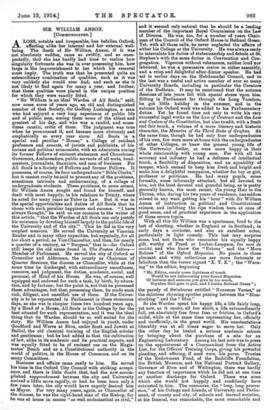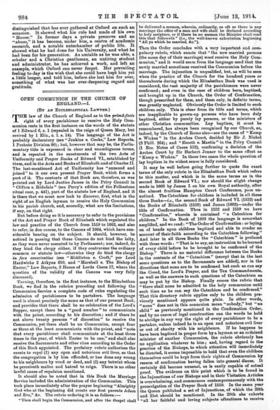A LOSS, notable and irreparable, has befallen Oxford, affectin g alike her
internal and her external well- being. The death of Sir William Anson, if it was not absolutely sudden, came so swiftly, and so unex- pectedly, that she has hardly had time to realize how singularly fortunate she was in ever possessing him, how large is the impoverishment to her which his removal must imply. The truth was that he presented quite an extraordinary combination of qualities, such as it was very unlikely she would ever find, and such as she is not likely to find again for many a year, and further, that these qualities were placed in the unique position for which they were exactly fitted. "Sir William is an ideal Warden of All Souls," said, now some score of years ago, an old and distinguished member of that Society, Sir Godfrey Lushington, a man who had enjoyed a very long experience of public life and of public men, among them some of the ablest and greatest of his day, and who was a candid, and some- times caustic, critic of them. The judgment was true when he pronounced it, and became more obviously and emphatically so every year since. All Souls is a special and peculiar " House," a College of resident professors and savants, of jurists and publicists, of his- torians and political economists, with an admixture among its former Fellows of eminent statesmen and Churchmen. Governors, Ambassadors, public servants of all sorts, head- masters, journalists, financiers, and men of business. For All Souls is a Society of Fellows and former Fellows. It possesses, of course, its four undergraduate" Bible Clerks," but it cannot really be said to present any of the problems, sometimes intricate and embarrassing, of a college of undergraduate students. These problems, to some extent, Sir William Anson sought and found for himself, and dealt with most happily, in his relations to Trinity, where he acted for many years as Tutor in Law. But it was in the special opportunities and duties of All Souls that he shone with such peculiar happiness and success. "I have always thought," he said on one occasion to the writer of this article, "that the Warden of All Souls can only justify his existence by devoting himself largely to the public life of the University and of the city." This he did in the very amplest measure. He served the University as Vinerian Reader and in many other capacities, but especially, for all too short a period, as Vice-Chancellor, and then, for nearly a quarter of a century, as "Burgess," that is—for Oxford still keeps the old name found in The Paston Letters— Member of Parliament. He served the city of Oxford as Councillor and Alderman, the county as Chairman of Quarter Sessions, the diocese as Chancellor, while at the same time he discharged, with extraordinary smoothness, resource, and judgment, the duties, academic, social, and personal, of Head of his House. He was, of course, well equipped and endowed for such a task, by birth, by educa- tion, and by fortune; but the point is, not that he possessed these advantages, but that, possessing them, he made such rich, diligent, and unselfish use of them. If the Univer- sity is to be represented in Parliament in these strenuous days, as she was in sleepier times two hundred years ago, by a Head of a House, All Souls is the College by far the best situated for such representation, and it was the ideal thing that its Warden should be so well suited for the duty. Sir William Anson had enjoyed in youth, under Goodford and Warre at Eton, under Scott and Jewett at Bailie], the old classical training of the English scholar and gentleman; but he had added to that the cultivation of law, alike in its academic and its practical aspects, and was equally fitted to be of eminent use on the Magis- trates' Bench and as a Constitutional authority in the world of politics, in the House of Commons, and on its many Committees. Business and affairs came easily to him. He served bis time in the Oxford City Council with striking accept- ance, and there is little doubt that, had the now accom- plished rapprochement between the city and University arrived a little more rapidly, or had he been born only a few years later, the city would have eagerly desired him as Mayor. For very many years, again, as Chancellor of the diocese, he was the right-hand man of the Bishop, for he was at home in causes "as well ecclesiastical as civil," and it seemed only natural that he should be a leading member of the important Royal Commission on the Law of Divorce. He was, too. for a number of years Chair- man of the Council of the Oxford House in Bethnal Green. Yet, with all these calls, he never neglected the affairs of either his College or the University. He was always ready to intercalate his duties of statesmanship and debate at St. Stephen's with the same duties in Convocation and Con- gregation. Vigorous without vehemence, neither loud nor laboured, he was a persuasive orator in either assembly, and a crisp and delightful after-dinner speaker. He had sat in earlier days on the Hebdomadal Council, and to the last was a useful and active member of ever so many University Boards, including in particular the Curators of the Bodleian. It may be mentioned that the autumn Sessions of late years fell with special stress upon him. Sitting in Parliament far through the Long Vacation, he got little holiday in the summer, and in the autumn his Oxford work was added to his Parliamentary duties. Yet he found time not only to write his very successful legal works on the Law of Contract and the Law and Custom of the Constitution, but also to edit, with a fresh and fair touch, a volume of a more literary and historio character, the Memoirs of the Third Duke of Grafton. At the same time, though he had only four undergraduates of his own, few were more at home with the undergraduates of other Colleges, or knew the general young life of the University better, or were more happy in their whole relationship with young men. For with all his accuracy and industry he had a deftness of intellectual touch, a flexibility of disposition, and an equability of temper, which seemed to keep him fresh and bright and make him a delightful companion, whether for boy or girl, professor or politician. He had many pupils, some formally, some informally attached, but all devoted to him, not the least devoted and grateful being, as is pretty generally known, the most recent, the young Heir to the Throne, who, during his two years of residence, has seldom missed in any week getting his "hour" " with Sir William Anson of instruction in political and Constitutional science, and imbibing the ripe wisdom born at once of good sense, and of practical experience in the application of these severe topics. With all this Sir William was a sportsman, fond to the last of shooting, whether in England or in Scotland; in early days a cricketer, and also an excellent actor, particularly in light comedy. This last may surprise some, but not those who remember his equally happy gift, worthy of Praed or Locker-Lampson, for vers de sociate, and who know the " Echoes " and the "More Echoes " of the Oxford Magazine. No pieces in those pleasant and witty collections are more fortunate or felicitous than the verses signed "X. Y. Z."; the "Warn- ing" to the editor, beginning
"Mr. Editor, surely some lightness of touch Would be not unbecoming your famed Magazine. Of lectures and sermons you give us too much,
Toynbee Hall gets to pall, and I loathe Bethnal Green"; the parody of Swinburne entitled "Nonsense Verses," or the delicious rhyming epistles passing between the " Blue- stocking " and the "Blue." So the Warden spent his happy life, a life fairly long, yet now, as it seems, all too short, a life extraordinarily full, yet absolutely free frorn fuss or friction, in Oxford'. midst, while at the same time representing her, officially and unofficially, in the great world. His unostentatious liberality was at all times eager to serve her. Only the other day he healed a serious academic schism by bringing about the purchase of a site for an Engineering Laboratory. Among his last acts was to press on the appointment of a Commandant from the Active List, for the Officers' Training Corps, giving his powerful pleading, and offering, if need were, his purse. Trustee of the Endowment Fund, of the Radcliffe Foundation, the British Museum, and the National Portrait Gallery, Governor of Eton and of Wellington, there was hardly any function of importance which he did not at one time or another discharge for Oxford. There was none which she would not happily and confidently have entrusted to him. The concourse, the "long, long proces- sion," of his College and friends, of University and Parlia- ment, of county and city, of schools and learned societies, at his funeral, was remarkable, the most remarkable and
distinguished that has ever gathered at Oxford on such an occasion. It showed what his rule had made of his own " House." In former days a private preserve and an "abuse," it has become, under him, a centre of academic research, and a notable antechamber of public life. It showed what he had done for his University, and what he had been for his generation. As amiable as he was able, a scholar and a Christian gentleman, an untiring student and administrator, be has achieved a work, and left an example, which Oxford can never forget. Her prevailing feeling to-day is the wish that she could have kept him yet a little longer, and told him, before she lost him for ever, something of what was her ever-deepening regard and gratitude.











































 Previous page
Previous page